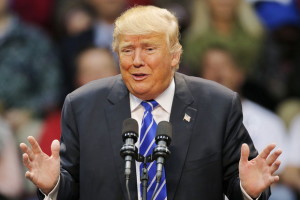
6 May 2016 – When I read the analysis and reviews of the Donald Trump juggernaut, I feel like I am watching that classic movie, “Rashomon”: we all read the same articles and yet, from our different viewpoints, coming to entirely different conclusions from the same set of statements, opinions and facts.
This past March I wrote about “The Donald” and noted my “underlying truths” (in my estimation):
1.People, for God’s sake: Donald Trump is the price you pay for living in a marketplace culture. You created him. Corporatism rules.
2. Listen to the people voting for him. Nobody actually believes that Trump can deliver what he promises. What people hope is that Trump will keep the right “attitude” about the things most Americans believe are important and apply those attitudes.
It was long in coming. When democracy slithers towards oligarchy, as has America, the mob retaliates. Congress has become an aloof, gerrymandered, constitutional dinosaur. It renders the most powerful nation on Earth ungovernable.
So that rabble … uh, sorry, “democracy” … says “No problem! We have an antidote!” And democracy votes for the outsider, the anti-Washingtonian, the shaker-up of things. If the establishment gangs up to stop him, democracy backs him all the more. It backs him even if he is Trump. “Let that be a lesson!” says democracy, to all oligarchs and stuffed shirts and nice talkers: “Step out of line and we will give you someone so awful, so disruptive, he will be a nightmare.
People cringe at his vulgarity, clutching at their pearls. The immaturity of so many moments. The demagogue’s instinct for amplifying the angriest voice in the mob. The media, which has grown used to covering Trump as a sideshow, delights in each moment along with him — it was funny, and it meant clicks, takes, traffic. MONEY!!
Because for the media … ok, in America in general … it all about the money, only about the money. As Rolling Stone’s Matt Taibbi has noted, as well as a series in Ad Age, plus even CBS President Leslie Moonves, the media should not be scolded for the clicks and kicks they provide to readers. They have an open incentive to promote Trump by openly delighting in the ad money. Moonvies: “what a fun Trump campaign brought to my network. And the money. It’s a terrible thing to say. But, bring it on, Donald. Keep going!!”
And Trump’s saturation of the media market post — especially his post-Indiana “victory lap” — is indicative of how he plans to approach the general-election campaign. Instead of relying on traditional methods of communication — paid advertising, carefully-chosen interviews, corporate-crafted Facebook posts — he will be the medium and the message, unpredictable and always around.
For Democrats and Republicans, the obvious consequence of Trump’s ubiquity is that regardless of what they want to focus on, they will likely be forced to respond each day to the mogul’s latest whim. He looms each hour as a constant potential disturbance, for better or for worse. The Donald has emerged from the populist circuses of pro wrestling and New York City tabloids, via reality television and Twitter. He knows how the system works and how to play it.
And he just might prove James Madison was right:
“… democracies have ever been spectacles of turbulence and contention … and have in general been as short in their lives as they have been violent in their deaths”.
Trump is testing democracy’s singular weakness — its susceptibility to the demagogue — by blasting through the firewalls we once had in place to prevent such a person from seizing power.
Andrew Sullivan, in a recent piece in New York Magazine, had me scrambling for my Eric Hoffer. In Hoffer’s classic 1951 tract, The True Believer, he sketches the dynamics of a genuine mass movement. Hoffer was thinking of the upheavals in Europe in the first half of the century, but the book remains sobering, especially now.
Hoffer’s core insight was to locate the source of all truly mass movements in a collective sense of acute frustration. Not despair, or revolt, or resignation — but frustration simmering with rage. Mass movements, he notes (as did Tocqueville centuries before him), rarely arise when oppression or misery is at its worst (say, 2009); they tend to appear when the worst is behind us but the future seems not so much better (say, 2016). It is when a recovery finally gathers speed and some improvement is tangible but not yet widespread that the anger begins to rise. After the suffering of recession or unemployment, and despite hard work with stagnant or dwindling pay, the future stretches ahead with relief just out of reach.
When those who helped create the last recession face no consequences but renewed fabulous wealth, the anger reaches a crescendo.
We are witnessing a new world being born inside the hollowed-out shell of the American system, the usual checks and balances ignored and completely out of whack. We are in a reduced, shabbier and more dysfunctional version of the known. And no one even seems disturbed by the development – all of it instantly absorbed into what’s becoming the new normal.
Here in Europe, Trump-like characters are emerging from the ooze of a decaying political union. Some are deeply unattractive. Some are dangerous. But it is no good just deploring them. If Trump proves anything, it is that you can’t deplore all the people all the time. There is no substitute for listening, arguing, persuading – because sooner or later they get round to voting. Ugg. The nerve.